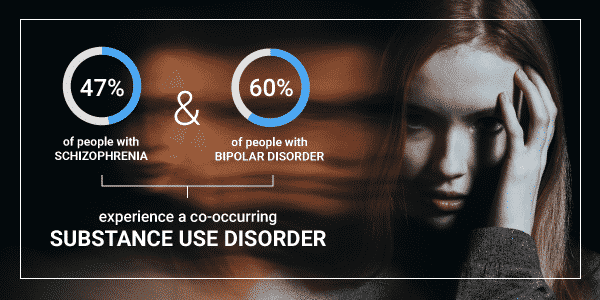People who become dependent on amphetamines like Adderall sometimes decrease their usage after experiencing side effects like paranoia and hallucinations.
For people with attention-deficit hyperactivity disorder (ADHD), Adderall can be beneficial to help them manage their symptoms. But when Adderall isn’t used as prescribed by a physician, it can result in Adderall induced psychosis.
Article at a Glance:
Some facts to remember about Adderall and psychosis include:
- Frequent Adderall use over a long period can cause what is referred to as substance-induced psychosis
- Although Adderall is approved for use by the FDA, it is classified by the DEA in the same category as drugs like cocaine and oxycodone.
- There is a possibility of developing Adderall psychosis or triggering the onset of a psychotic disorder
- Adderall psychosis typically resolves in a few days but it can last for years, in which case, a person may have a primary psychosis disorder.
- If someone has an Adderall use and psychotic disorder, it’s recommended that they seek treatment for both disorders because only treating one isn’t usually effective.
How Does Adderall Influence Psychosis and Paranoia Symptoms?
Adderall, an amphetamine, is often thought of as a safe or harmless drug but it has been linked with mental health conditions like psychosis and schizophrenia. When people who do not have ADHD take Adderall to do better in school, concentrate or to lose weight, they put themselves at a higher risk for developing abusive behaviors and dangerous side effects. People with ADHD have lower levels of dopamine in their brain, and these low levels mean their brain could seek stimulation. Adderall releases dopamine and other neurotransmitters, stimulating the central nervous system. When someone without ADHD takes Adderall, natural dopamine levels can increase to exceed an average level and cause feelings of euphoria and anxiety.
A study in the Diagnostic and Statistical Manual of Mental Disorders (DSM-5) found that “…amphetamine-related psychiatric disorders are conditions resulting from intoxication or long-term use of amphetamines or amphetamine derivatives. Such disorders can also be experienced during the withdrawal period from amphetamines.”
Amphetamines can cause or be associated with the recurrence of psychiatric disorders. People who become dependent on amphetamines sometimes decrease their usage after experiencing side effects like paranoia and hallucinations. Some people may experience symptoms during withdrawal as well as during sustained use.
Related Topic: Adderall overdose
Risks Of Using Adderall to Cope With Psychosis
People living with psychosis and other mental health conditions may use substances like Adderall to cope with or manage their symptoms. According to a study by the Epidemiological Catchment Area, 47 percent of people with schizophrenia and 60 percent of people with bipolar disorder were also living with a substance use disorder. In the general population, 16 percent of people were living with a substance use disorder. Living with psychosis by itself can be challenging for people to maintain a daily routine. When someone has an Adderall use disorder, it can cause serious problems. These problems may include suicide, an increased risk of violence, a higher chance of being involved in criminal activity and poor reception to treatment programs. Unfortunately, people with psychosis or people who have a genetic predisposition of psychosis are at a higher risk of developing substance use disorders.
In addition to the behavioral problems that someone with psychosis and a substance use disorder experience, the person is often in poor physical health. People with psychosis are at a higher risk of cardiovascular diseases. Taking Adderall can cause heart problems to develop. Mortality rates are higher in people with psychosis because of their poor overall health and the increased risk of suicide.
Taking Adderall to treat symptoms of psychosis can often make their symptoms worse.

Can Adderall Cause Psychosis?
A study published as early as 1969 explored the connection between psychosis and substance use disorder. Researchers have been trying to determine the cause of psychosis for decades. While there is no definitive answer, early studies found that substances like amphetamines could trigger an onset of psychosis symptoms in otherwise healthy patients. Drug-induced psychosis was reported in up to 46 percent of people who regularly use amphetamines. The research suggested that the reason amphetamines, such as Adderall, may cause psychosis is because as a stimulant, amphetamines typically cause sleep problems or disorders for people who take them. The sleep deprivation that comes as a side effect of taking Adderall can be responsible for the onset of psychotic symptoms.
What is Adderall Psychosis?
Adderall psychosis occurs when someone uses a drug regularly for an extended period and begins experiencing psychotic symptoms. Psychosis induced by Adderall use can last days, months and even years after someone stops taking the drug. The difference between a psychosis disorder and a substance-induced psychotic disorder is that the psychotic symptoms emerged after someone was using a drug. The presentation of symptoms is slightly different in Adderall psychosis compared to primary psychosis. Researchers suggest that a primary psychotic disorder and a substance-induced psychosis disorder shouldn’t necessarily be considered two separate conditions but are recognized as two disorders that are closely associated. People who develop Adderall psychosis should be monitored closely. Further use of Adderall or any other type of stimulant is discouraged. Adderall psychosis can typically be resolved with abstinence from the substance.
Signs and Symptoms of Adderall Psychosis
The onset of Adderall psychosis typically doesn’t last as long as primary psychosis. The symptoms present themselves in a slightly different way. If psychotic symptoms emerge following the use of Adderall, the more prevalent symptoms are typically agitation and confusion. Some other symptoms of Adderall psychosis include:
- Lack of concentration
- Delusions
- Increased motor activity
- Disorganized thoughts
- Anxiety
- Hallucinations
- Lethargy
- Violent behavior
- Socially withdrawn
- Paranoia
Signs and Symptoms of Adderall Paranoia
Adderall paranoia is a symptom of Adderall-induced psychosis. Adderall paranoia can cause someone to experience auditory and visual hallucinations as well as suspicions that someone or something is out to get them. Some behavioral symptoms of Adderall paranoia include:
- Mistrust
- Extremely cautious
- Defensive attitude
- Inability to relax
- Argumentative
Fortunately, if someone develops Adderall paranoia, the disorder will typically resolve itself within a few days after the person stops taking the drug.
How to Get Treatment for Adderall Psychosis and Co-Occurring Drug Use
When someone has a substance use disorder and psychosis, the best way to manage their symptoms and addiction is to get treatment. It’s important to seek treatment facilities that can treat both disorders at the same time. When one disorder is addressed and the other is not, the chance of a setback increases. The rate of setbacks in psychosis patients is also higher among those who abuse drugs, especially stimulants like Adderall. Treatment for co-occurring disorders may consist of a combination of therapy and medications. Depending on the treatment facility, the patient may be required to engage in individual therapy, group therapy or both. Most facilities may only offer medications for a patient’s mental health disorder and for their addiction. Fortunately, there are facilities across the country that can design individualized treatment plans for patients so that their treatment is effective.
If you use Adderall and want to learn more about your substance use behaviors, take The Recovery Village’s self-assessment. This quiz can help you recognize the presence of an Adderall addiction or dependence.
If you or someone you know is struggling with an Adderall use or co-occurring disorder like psychosis, help is available. At The Recovery Village, a team of professionals can create an individualized treatment plan to suit your needs. Call and speak with a representative to learn more about which program could work for you.


Bramness, Jørgen G, et al. “Amphetamine-induced psychosis – a sepa[…]d in the vulnerable?” December 5th, 2012. Accessed August 6, 2019.
National Collaborating Centre for Mental Health (UK). “Psychosis with Coexisting Substance Misuse.” 2011. Accessed August 6, 2019.
Regier Darrel A., MD, MPH; Mary E. Farmer, MD, MPH; Donald S. Rae, MS; et al. “Comorbidity of mental disorders with alc[…]ent Area (ECA) Study”. November 21th, 1990. Accessed August 6, 2019.
Wade, D., et al. “Substance misuse in first-episode psycho[…]tive follow-up study.” Cambridge University Press, September 2006. Accessed August 6, 2019.
The Recovery Village aims to improve the quality of life for people struggling with substance use or mental health disorder with fact-based content about the nature of behavioral health conditions, treatment options and their related outcomes. We publish material that is researched, cited, edited and reviewed by licensed medical professionals. The information we provide is not intended to be a substitute for professional medical advice, diagnosis or treatment. It should not be used in place of the advice of your physician or other qualified healthcare providers.